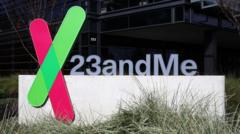23andMe, once soaring with an impressive valuation, is now struggling to adapt following major losses in consumer trust and leadership changes.
23andMe Faces Existential Crisis Amidst Plummeting Stock Prices

23andMe Faces Existential Crisis Amidst Plummeting Stock Prices
The once-thriving DNA testing company battles to maintain its privacy commitments after a significant financial decline.
From a standout tech sensation to a troubling financial outlook, 23andMe is experiencing dramatic changes that have raised serious concerns regarding customer data protection and its long-term survival. Once priced at a staggering $321 per share, the company now struggles at just under $5, prompting fears of potential delisting from stock markets. With a reputation for offering genetic insights that transformed lives, including shocking ancestry revelations for many users, the firm is facing an uncertain future.
Experts attribute the company's woes to the absence of a viable ongoing business model after the initial sale of DNA test kits. The prolonged timeline before monetizing its extensive anonymized DNA database for drug research has compounded these issues. Professor Dimitris Andriosopoulos expresses a bleak outlook, suggesting that 23andMe may have limited time left to resolve its operational troubles.
Amidst these challenges, 23andMe's board has undergone a significant shake-up, leaving CEO and co-founder Anne Wojcicki as the only remaining original member. Speculation about the company's fate is rampant, with even discussions of potential sale amidst increasing competition. However, the company's official stance is a commitment to remain independent, as Wojcicki reportedly aims to take the company private.
The alarming aspect of 23andMe's struggles isn't just financial; it revolves around the sensitive genetic data held within its vast database. Privacy advocates like Carissa Veliz stress the importance of securing this information not just for individuals but for interconnected families, as DNA testing affects the privacy of many. The potential ramifications of any data breach or ownership change could be dire, leading to situations where personal genetic information could be exploited.
Despite 23andMe's assurances about adhering to current data protection regulations and maintaining customer privacy through future transitions, skepticism remains high. As the public grows more concerned about data safety, Veliz warns against the current permissive practices of data companies, advocating for stricter regulations and the end of the trade in personal data.
Ultimately, while 23andMe battles to stabilize its operations, it must also address the pressing concerns of users who granted it access to their deeply personal genetic information, ensuring their trust is not misplaced.






















